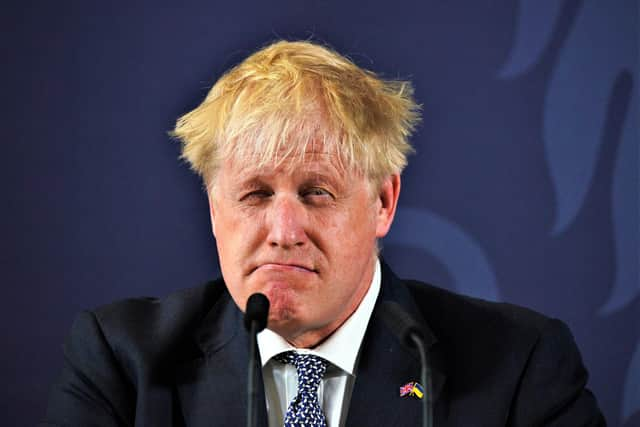Watch for yourself: Arlene Foster - one of the DUP's new eight-strong Protocol judging panel - backed first draft of Boris Johnson's 2019 Brexit plan
and live on Freeview channel 276
In large measure that’s because of her role alongside the likes of Jim Allister and David Trimble in trying to have it overturned by the courts (a bid which was struck down in the first week of January).
However her critics – in particular the UUP peer Lord Empey – have repeatedly sought to highlight her actions as DUP leader in October 2019, at a crucial time in the development of the Tories’ Brexit plans.
Advertisement
Hide AdAdvertisement
Hide AdAfter a stream of criticism of the ‘Irish backstop’ suggested under Theresa May, Boris Johnson’s government presented his revised Brexit proposals.
Among the points was it “provides for the potential creation of an all-island regulatory zone on the island of Ireland, covering all goods including agrifood and eliminating all regulatory checks for trade in goods between Northern Ireland and Ireland”.
Stormont would vote to ratify this every four years.
In the hours before the deal was formally unveiled on October 2, Mrs Foster told the BBC that morning: “I think progress is being made …


“But [Johnson] is also very clear if the EU rejects what I think is a sensible and balanced deal, and is about compromise, if they reject that then we’ll be entering the realms of ‘no deal’ and we don't want that to happen, because no deal is not a final destination for anybody.”
Advertisement
Hide AdAdvertisement
Hide AdThe government published details of the deal mid-afternoon that day, and on the BBC evening news Mrs Foster said: “We believe this is a serious and sensible way forward to have engagement with the EU in a way that allows us all in the UK to leave the EU and therefore we’ll be supporting this plan.”
Asked about what seemed to be a regulatory border in the Irish Sea, Mrs Foster had replied: “What it does is allows us to leave the EU customs union, it allows us to leave the single market, and then we opt-in if we’re not in the position to put in place alternative arrangements...
“That’s the difference – the big difference. And we believe it’s something that works for NI whilst letting us leave the EU.”
The PM’s proposals met EU resistance, but negotiations weeks later led to the current protocol, and the DUP declined its support.
• ROBINSON COMES OUT OF RETIREMENT – AGAIN •
Advertisement
Hide AdAdvertisement
Hide AdFormer DUP leader Peter Robinson – another key member of the DUP’s panel-of-eight – has form when it comes to offering advice to those who succeeded him at the party helm.
Back in June 2017, the year after he bowed out of frontline politics, he put forward a suggestion via his Facebook account to his chosen successor Arlene Foster, who was then embroiled in the fallout from Sinn Fein collapsing Stormont.
Whilst ostensibly saying it was about the RHI scandal, it was widely understood that the price of Sinn Fein returning to government was an Irish language act, something which Mrs Foster had publicly opposed.
Mr Robinson had suggested at the time that a solution to the impasse might be a broader cultural act, saying: “It is entirely legitimate for Sinn Fein to press for an Irish Language Act . . .
“But that can never be a one-way street . . .
Advertisement
Hide AdAdvertisement
Hide Ad“So let’s see a sensible deal. Who can complain if there are those who cherish the Irish language or who passionately support Ulster-Scots culture?
“Who would find it unacceptable for arrangements to be put on a statutory basis to protect and support both?
“Both can be accommodated.”